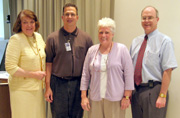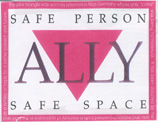D. Moritz used a self-effacing, humorous conversation style, interactive audience participation and an eye-opening review of anti-gay bias in America in her presentation of “Rainbow at UNMC: Lessons in Gay and Lesbian Issues,” on June 24.
 |
From left: Irene Klintberg, Ph.D., executive associate dean of the UNMC College of Medicine; Gary Beck, education program coordinator of the UNMC department of pediatrics; D. Moritz; and James O. Armitage, M.D., dean of the College of Medicine. |
“First of all, I want you to know that UNMC is first hospital or medical center in Omaha to invite me to speak – that says a lot about your commitment to diversity and creating a safe environment for all people,” said Moritz, assistant director of Gay, Lesbian, Bisexual, Transgender and Ally Programs and Services (GLBT), at the University of Nebraska-Lincoln.
“The creation of my office is a major step for our entire university system. Dr. Perlman is serious about making all of our campuses safe for GLBT students, faculty and staff.”
Moritz, who billed herself as “recovering hippy,” lived up to that image, particularly in terms of her laid-back speaking style. She cracked a lot of jokes and even announced she would finish the last three slides of her PowerPoint presentation and then displayed three drawings of children’s playground slides.
But she opened with a very sobering review of anti-gay bias statistics produced from several national research studies. Some of her anti-gay research included:
- Gay and lesbian youths represent 30 percent of all completed teen suicides (a successful suicide attempt every 5 hours, 48 minutes).
- 24 percent of gay/lesbian/bisexual youths reported getting pregnant or getting someone pregnant, and many GLB youth acquire HIV/STD’s having sex with multiple partners of the opposite gender just to “prove” they are not gay.
- 80 percent of prospective teachers report negative attitudes toward gay and lesbian people.
- 90.8 percent of students surveyed reported hearing “that’s so gay” regularly – one of 26 anti-gay comments (like “faggot” and “dyke”) that are heard by a high school students on a typical day. In 97 percent of these incidents, teachers do not intervene.
- 41.9 percent of GLBT students reported report being physically attacked because of their sexual orientation, and 28 percent of gay youth drop out of school.
“Anti-gay bias is pervasive throughout our society – we all have it,” Moritz said. “It is not our fault, we are not to blame, but we must accept responsibility for it within ourselves.”
Moritz taught that there are three levels of anti-gay bias. Personal anti-gay bias is a form of prejudice. It is the personal belief that lesbian, gay and bisexual people are sinful, immoral, sick and inferior to heterosexuals or incomplete women and men.
Interpersonal anti-gay bias is the fear, dislike or hatred of people believed to be lesbian, gay or bisexual. Name-calling, ostracism, verbal and physical harassment, and individual acts of discrimination may express this hatred or dislike.
Institutional anti-gay bias refers to the many ways in which government, businesses and other institutions and organizations discriminate against people on the basis of sexual orientation. These groups set policies, allocate resources and maintain unwritten standards for behavior of their members in ways that discriminate.
“Today, GLBT students are actually sought after by college recruiters,” Moritz said. “These students have a high level of resilience and high leadership skills. They are often over-achievers who hide their sexual preference behind an image of being so ‘good’ that nobody would ever suspect they were gay.”
Ultimately, Moritz said, all people have to take an active role in making life in America more egalitarian and safe for people who are GLBT. She suggested the following steps.
- Become educated regarding sexual orientation – dispel myths and stereotypes.
- Remember that GLBT students are often uncomfortable, invisible, isolated and need acceptance.
- Don’t permit any demeaning slurs, jokes or physical gestures (e.g., limp wrist) in your presence.
- Include gay issues when discussing minority/multicultural issues.
- Treat the topic of “sexual orientation” as you would any other human variation – not bad, but only different.
- Convey respect and show that each student is valued. If a student tells you that he/she is gay, thank the person for trusting you and keep it to yourself.
At the end of her presentation, Moritz distributed pink triangle “Safe Person-Safe Space” cards. Audience members were asked to post prominently in their work space.
 |
The pink triangle was worn by prisoners in Nazi German who only “crime” was being homosexual. It has been adopted by the gay and lesbian movement both in memory of oppression in the past and as a symbol of hope for a better present and future. |
“The message is that the person displaying the symbol understands and is supportive and trustworthy, if a gay, lesbian or bisexual student needs help, advice or just someone to whom they can talk,” Moritz said.
“Rainbow at UNMC” was sponsored by the College of Medicine Dean’s Office and the UNMC/NHS Employee Diversity Network.